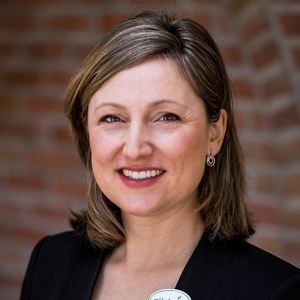Social Work Month: Social Workers Play an Important Role in End-of-life Care
Social Work Month: Social Workers Play an Important Role in End-of-life Care

March is Social Work Month—the perfect opportunity to spotlight the essential role of social workers for people with serious illness.
Gilchrist social workers are key members of each patient’s team. Our patients and families are facing life’s toughest challenge—they are often overwhelmed, confused and scared. Our social workers listen with empathy and counsel families through these difficulties. They help navigate unfamiliar systems and facilitate difficult conversations. Our social workers are there to support our patients’ and families’ emotional and social well-being, no matter what their needs are.
We sat down with Gilchrist Elder Medical Care social worker Amy Hewat, LMSW, to learn more about how social workers help people with serious illness.
What are some of the things you do as a social worker at Gilchrist?
As an Elder Medical Care social worker helping people who have serious illness, Ioffer emotional support and assist with problem-solving for practical challenges that arise. I also facilitate advance care planning, which includes helping people make decisions about their wishes for care as their needs increase, such as whether they would want life support.
Can you describe how you and other social workers have helped a particular patient or family?
One of our patients was living alone in a dark basement apartment with very little support. He struggled to afford his prescriptions and manage his health alone. Over the course of three years, his social worker, along with the nurse practitioner, worked with the pharmacy team to find more affordable prescriptions to stabilize his medical condition. We also arranged food delivery through our Pantry2Porch program, which reduced isolation.
In addition, we supported him in transitioning into a congregate care program. This program provides seniors with two meals a day and assistance with light housekeeping in wheelchair-accessible apartments, with easy access to services, transportation and activities. He will soon be living in a newly built, light-filled apartment in the community.
Another example is a patient who requires weekly blood tests to monitor for blood clots due to a medication he is taking. We brought a machine into his home that allows the testing to be done there, with results sent to his care team so he doesn’t have to go to a clinic each week.
Additionally, the patient has struggled with challenging family dynamics for many years, which were compounded due to his physical limitations and depression. After several counseling sessions with his social worker, the patient was able to break negative cycles of communication within his home and live in a more positive, harmonious environment—even though his circumstances never changed. He attributes the shift in his perspective in part to the sessions with his social worker.
How do you work with other members of the patient’s care team?
Often our providers will visit a family that is taking good care of their loved one but feels overwhelmed, stressed or discouraged. The provider will reach out to the social worker so we can speak with the family members about how they can bring a care team around them to support them through these challenges. We discuss options such as exploring the next level of care and what the future might look like should care needs increase. Many care partners have their own chronic illnesses, injuries or life circumstances that limit their ability to care for their loved one in the way they would like. We can help them think through options for supporting themselves and their loved ones.
What has been some of the feedback you have received from patients and families?
Many families wish they had known about Elder Medical Care sooner, as their loved one may have previously gone through extended periods without medical care due to an inability to get out of the house. They also tell us they wish they had known sooner about the seamless transition between Elder Medical Care and hospice when a loved one stabilizes and no longer needs hospice but still needs the in-home care and support of the Elder Medical Care team.
Why did you become a social worker and why did you choose to work with older adults at the end of life?
I became a social worker to understand how to promote and restore dignity and hope for those who are struggling, whether it be with disease, trauma, poverty or other loss. I decided to work with older adults because I have great respect for the wisdom that comes with age and believe that we all deserve to be respected and supported in our later years, instead of being left behind, which is how many feel at this stage of life. I am also passionate about understanding the effects of Alzheimer’s and other dementias on the mind and body in order to help caregivers, family members and the health care industry provide creative solutions for dignified care.
What is the most fulfilling part of your work?
I am thankful to work for Elder Medical Care because I have an opportunity to spend more time getting to know patients and families and help them achieve their goals so that the time they have left is as meaningful as possible. The most fulfilling part of my work is seeing the resilience and resourcefulness of patients and caregivers who are managing incredibly difficult situations of chronic and debilitating illness with grace, who are willing to reach out for help.
To learn more about Elder Medical Care at Gilchrist, visit gilchristcares.org/elder-medical-care.
To support our work, visit gilchristcares.org/give.


